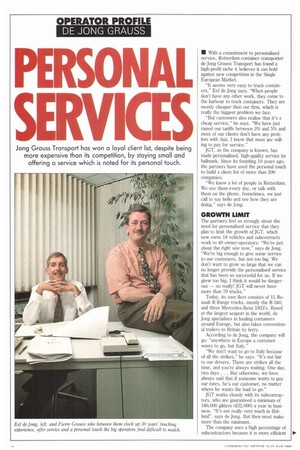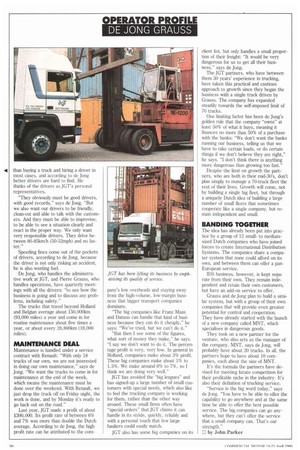PERSONAL
Page 54

Page 56

If you've noticed an error in this article please click here to report it so we can fix it.
SEM/
Jong Grauss Transport has won a loyal client list, despite being more expensive than its competition, by staying small and offering a service which is noted for its personal touch.
• With a commitment to personalised service, Rotterdam container transporter de Jong Grauss Transport has found a high-profit niche it believes it can hold against new competition in the Single European Market.
"It seems very easy to truck containers," Eef de Jong says. "When people don't have any other work, they come to the harbour to truck containers. They are mostly cheaper than our firm, which is really the biggest problem we face.
"But customers also realise that it's a cheap service," he says. "We have just raised our tariffs between 3% and 5% and most of our clients don't have any problem with that. [know that most are willing to pay for service."
JGT, as the company is known, has made personalised, high-quality service its hallmark. Since its founding 10 years ago, the partners have used the personal touch to build a client list of more than 200 companies.
"We know a lot of people in Rotterdam. We see them every day, or talk with them on the phone. Sometimes, we just call to say hello and see how they are doing," says de Jong.
GROWTH UMIT
The partners feel so strongly about the need for personalised service that they plan to limit the growth of JGT, which now owns 18 vehicles and subcontracts work to 40 owner-operators: "We're just about the right size now," says de Jong. "We're big enough to give some service to our customers, but not too big. We don't want to grow so large that we can no longer provide the personalised service that has been so successful for us. If we grew too big, I think it would be dangerous — no really! JGT will never have more than 70 trucks."
Today, its own fleet consists of 15 Renault R-Range trucks, mostly the R-340, and three Mercedes-Benz 1933's. Based at the largest seaport in the world, de Jong specialises in hauling containers around Europe, but also takes conventional trailers to Britain by ferry.
According to de Jong, the company will go: "anywhere in Europe a customer wants to go, but Italy."
"We don't want to go to Italy because of all the strikes," he says. "It's not fair to our drivers. There are strikes all the time, and you're always waiting. One day, two days . . . But otherwise, we have always said that if someone wants to pay our rates, he's our customer, no matter where he wants the load to go."
JGT works closely with its subcontractors, who are guaranteed a minimum of 160,000 gilders (i52,000) a year in business. "It's not really very much in Holland", says de Jong. But then most make more than the minimum.
The company uses a high percentage of subcontractors because it is more efficient
than buying a truck and hiring a driver in most cases, and according to de Jong better drivers are hard to find. He thinks of the drivers as JG1"s personal representatives.
"They obviously must be good drivers, with good records," says de Jong. "But we also want our drivers to be friendly, clean-cut and able to talk with the customers. And they must be able to improvise, to be able to see a situation clearly and react in the proper way. We only want very responsible drivers. They drive between 80-85km/h (50-52mph) and no faster."
Speeding fines come out of the pockets of drivers, according to de Jong, because the driver is not only risking an accident, he is also wasting fuel.
De Jong, who handles the administrative work at JGT, and Pierre Grauss, who handles operations, have quarterly meetings with all the drivers: "to see how the business is going and to discuss any problems, including safety."
The trucks that travel beyond Holland and Belgian average about 150,0001cm (93,000 miles) a year and come in for routine maintenance about five times a year, or about every 28,800km (18,000 miles).
MAINTENANCE DEAL
Maintenance is handled under a service contract with Renault: "With only 18 trucks of our own, we are not interested in doing our own maintenance," says de Jong. "We want the trucks to come in for maintenance at the end of the week, which means the maintenance must be done over the weekend. With Renault, we just drop the truck off on Friday night, the work is done, and by Monday it's ready to go back out on the road."
Last year, JGT made a profit of about 200,000. Its profit rate of between 6% and 7% was more than double the Dutch average. According to de Jong, the high profit rate can be attributed to the corn pany's low overheads and staying away from the high-volume, low-margin business that bigger transport companies dominate.
"The big companies like Franz Maas and Danzas can handle that kind of business because they can do it cheaply," he says: "We've tried, but we can't do it."
"But then I see some of the figures, what sort of money they make," he says. "I say we don't want to do it. The percentage profit is very, very low. In general in Holland, companies make about 3% profit These big companies make about 1% to 1.5%. We make around 6% to 7%, so I think we are doing very well."
JGT has avoided the "big leagues" and has signed-up a large number of small customers with special needs, which also like to feel the trucking company is working for them, rather than the other way around. These small firms often have "special orders" that JGT claims it can handle in its stride, quickly, reliably and with a personal touch that few large hauliers could easily match.
JOT also has some big companies on its client list, but only handles a small proportion of their freight: "It would be very dangerous for us to get all their business," says de Jong.
The JGT partners, who have between them 30 years' experience in trucking, have taken this practical and cautious approach to growth since they began the business with a single truck driven by Grauss. The company has expanded steadily towards the self-imposed limit of 70 trucks.
One limiting factor has been de Jong's golden rule that the company "owns" at least 50% of what it buys, meaning it finances no more than 50% of a purchase with the banks: "We don't want the banks running our business, telling us that we have to take certain loads, or do certain things if we don't believe they are right," he says. "I don't think there is anything more dangerous than growing too fast."
Despite the limit on growth the partners, who are both in their mid-30's, don't plan simply to manage a 70-truck fleet the rest of their lives. Growth will come, not by building a single big fleet, but through a uniquely Dutch idea of building a large number of small fleets that sometimes cooperate like a single company, but remain independent and small.
BANDING TOGETHER
The idea has already been put into practice by a group of 12 smallto mediumsized Dutch companies who have joined forces to create International Distribution Systems. The companies share a computer system that none could afford on its own, and between them can offer a panEuropean service.
IDS business, however, is kept separate from their own. They remain independent and retain their own customers, but have an add-on service to offer.
Grauss and de Jong plan to build a similar system, but with a group of their own companies that will provide even greater potential for control and cooperation. They have already started with the launch of a new company called MNT, which specialises in dangerous goods.
They took on a new partner for the venture, who also acts as the manager of the company. MNT, says de Jong, will probably have about 20 trucks. In all, the partners hope to have about 10 companies, each about the size of MNT.
It's the formula the partners have devised for meeting future competition for their profitable niche in the industry. It's also their definition of trucking service.
"Service is the big word today," says de Jong. "You have to be able to offer the capability to go anywhere and at the same time be able to offer the best possible service. The big companies can go anywhere, but they can't offer the service that a small company can. That's our strength."
El by John Parker








































































































































